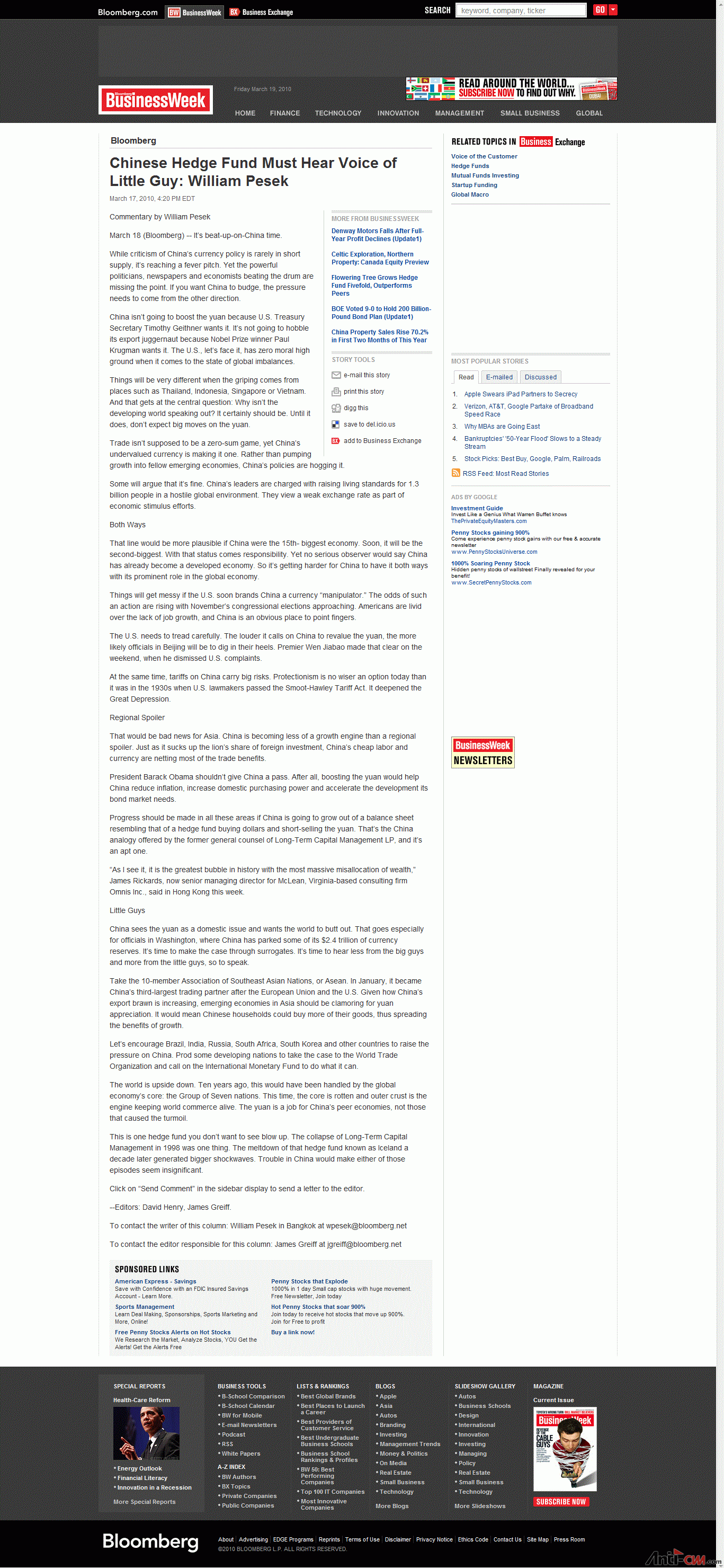Chinese Hedge Fund Must Hear Voice of Little Guy: William PesekMarch 17, 2010, 4:20 PM EDT http://www.businessweek.com/news/2010-03-17/chinese-hedge-fund-must-hear-voice-of-little-guy-william-pesek.html
Commentary by William PesekMarch 18 (Bloomberg) -- It’s beat-up-on-China time. While criticism of China’s currency policy is rarely in short supply, it’s reaching a fever pitch. Yet the powerful politicians, newspapers and economists beating the drum are missing the point. If you want China to budge, the pressure needs to come from the other direction.
China isn’t going to boost the yuan because U.S. Treasury Secretary Timothy Geithner wants it. It’s not going to hobble its export juggernaut because Nobel Prize winner Paul Krugman wants it. The U.S., let’s face it, has zero moral high ground when it comes to the state of global imbalances. Things will be very different when the griping comes from places such as Thailand, Indonesia, Singapore or Vietnam. And that gets at the central question: Why isn’t the developing world speaking out? It certainly should be. Until it does, don’t expect big moves on the yuan.
Trade isn’t supposed to be a zero-sum game, yet China’s undervalued currency is making it one. Rather than pumping growth into fellow emerging economies, China’s policies are hogging it.
Some will argue that it’s fine. China’s leaders are charged with raising living standards for 1.3 billion people in a hostile global environment. They view a weak exchange rate as part of economic stimulus efforts.
Both Ways That line would be more plausible if China were the 15th- biggest economy. Soon, it will be the second-biggest. With that status comes responsibility. Yet no serious observer would say China has already become a developed economy. So it’s getting harder for China to have it both ways with its prominent role in the global economy.
Things will get messy if the U.S. soon brands China a currency “manipulator.” The odds of such an action are rising with November’s congressional elections approaching. Americans are livid over the lack of job growth, and China is an obvious place to point fingers.
The U.S. needs to tread carefully. The louder it calls on China to revalue the yuan, the more likely officials in Beijing will be to dig in their heels. Premier Wen Jiabao made that clear on the weekend, when he dismissed U.S. complaints.
At the same time, tariffs on China carry big risks. Protectionism is no wiser an option today than it was in the 1930s when U.S. lawmakers passed the Smoot-Hawley Tariff Act. It deepened the Great Depression.
Regional Spoiler That would be bad news for Asia. China is becoming less of a growth engine than a regional spoiler. Just as it sucks up the lion’s share of foreign investment, China’s cheap labor and currency are netting most of the trade benefits.
President Barack Obama shouldn’t give China a pass. After all, boosting the yuan would help China reduce inflation, increase domestic purchasing power and accelerate the development its bond market needs.
Progress should be made in all these areas if China is going to grow out of a balance sheet resembling that of a hedge fund buying dollars and short-selling the yuan. That’s the China analogy offered by the former general counsel of Long-Term Capital Management LP, and it’s an apt one.
“As I see it, it is the greatest bubble in history with the most massive misallocation of wealth,” James Rickards, now senior managing director for McLean, Virginia-based consulting firm Omnis Inc., said in Hong Kong this week.
Little Guys China sees the yuan as a domestic issue and wants the world to butt out. That goes especially for officials in Washington, where China has parked some of its $2.4 trillion of currency reserves. It’s time to make the case through surrogates. It’s time to hear less from the big guys and more from the little guys, so to speak.
Take the 10-member Association of Southeast Asian Nations, or Asean. In January, it became China’s third-largest trading partner after the European Union and the U.S. Given how China’s export brawn is increasing, emerging economies in Asia should be clamoring for yuan appreciation. It would mean Chinese households could buy more of their goods, thus spreading the benefits of growth.
Let’s encourage Brazil, India, Russia, South Africa, South Korea and other countries to raise the pressure on China. Prod some developing nations to take the case to the World Trade Organization and call on the International Monetary Fund to do what it can.
The world is upside down. Ten years ago, this would have been handled by the global economy’s core: the Group of Seven nations. This time, the core is rotten and outer crust is the engine keeping world commerce alive. The yuan is a job for China’s peer economies, not those that caused the turmoil.
This is one hedge fund you don’t want to see blow up. The collapse of Long-Term Capital Management in 1998 was one thing. The meltdown of that hedge fund known as Iceland a decade later generated bigger shockwaves. Trouble in China would make either of those episodes seem insignificant.
--Editors: David Henry, James Greiff.
截图:

|